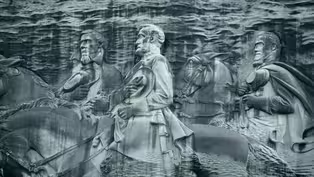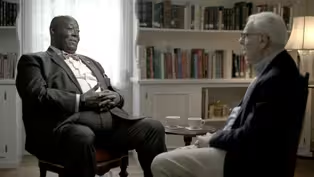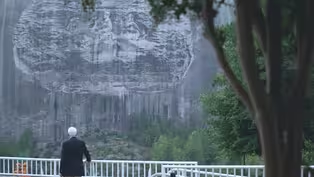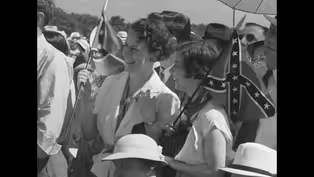
An Alternative Rationalization for the Civil War
Clip: Episode 7 | 3m 2sVideo has Closed Captions
Hasan Jeffries explains why some Southerners try to reframe the causes of the Civil War.
“In order to believe that the Confederacy and these Confederates were noble, you have to have this myth of victimization of white Southerners that they are the real victims during the Civil War... And any effort to redeem them ought to be considered heroic.” – History Professor Hasan Jeffries explaining how attempts to reframe the causes of the Civil War gained traction in The South.
Problems playing video? | Closed Captioning Feedback
Problems playing video? | Closed Captioning Feedback
Iconic America: Our Symbols and Stories with David Rubenstein is a production of Show of Force, DMR Productions, and WETA Washington, D.C. David M. Rubenstein is the host and executive...

An Alternative Rationalization for the Civil War
Clip: Episode 7 | 3m 2sVideo has Closed Captions
“In order to believe that the Confederacy and these Confederates were noble, you have to have this myth of victimization of white Southerners that they are the real victims during the Civil War... And any effort to redeem them ought to be considered heroic.” – History Professor Hasan Jeffries explaining how attempts to reframe the causes of the Civil War gained traction in The South.
Problems playing video? | Closed Captioning Feedback
How to Watch Iconic America
Iconic America is available to stream on pbs.org and the free PBS App, available on iPhone, Apple TV, Android TV, Android smartphones, Amazon Fire TV, Amazon Fire Tablet, Roku, Samsung Smart TV, and Vizio.
Buy Now

Our Symbols and Stories
David Rubenstein examines the history of America through some of its most iconic symbols, objects and places, in conversation with historical thinkers, community members and other experts. Together, they dive deep into each symbol’s history, using them as a gateway to understanding America’s past and present.Providing Support for PBS.org
Learn Moreabout PBS online sponsorship- We must recall those principles of loyalty, dignity, and honor that shine through the lives of men we commemorate today.
We must set aside the evils of sectionalism once and for all.
Just as the South cannot afford to discriminate against any of its own people, the rest of the nation cannot afford to discriminate against the south.
(clapping) (cheering) - [Interviewer] At the time of the dedication, did many people say it's not appropriate for the vice President of the United States to come to a confederate memorial?
- [Interviewee] People said that, and they also said how embarrassing it was that the President didn't come.
So you had both of those views.
It was intended to be a national monument.
It was about the entire south and then ultimately about the nation.
- How do people explain the fact that Robert E. Lee, Stonewall Jackson, and Jefferson Davis, these three men were fighting against the United States government?
Why would they be great national heroes?
- Because mythology elevated these folks into heroes.
- The carving of Stone Mountain was completed in the early 1970s.
But of course, the history of Confederate memorialization dates back immediately after the Civil War, after the Confederacy falls, after Robert E. Lee surrenders at Appomattox.
(light music) - [Interviewee] White Southerners were trying to wrestle with how could all of this death and destruction happen?
A fifth of the men of military age were dead.
And so, there was great loss and grieving and wondered, how could this happen to us?
- In order to believe that the Confederacy and these confederates were noble, you have to have this myth of victimization of white Southerners, that they are the real victims during the Civil War, but certainly afterward, and any effort to redeem them ought to be considered heroic.
- And so they came up with a rationalization called The Lost Cause that then got built upon and and ultimately became a national rationalization.
- The Lost Cause is a version of American history centered around the Civil War that suggests that slavery itself was a benign institution, that the Civil War was caused by a disagreement over states rights, including their right to preserve the institution of slavery.
But we're just gonna leave the slavery part out.
Confederate Monuments as a Constant Reminder of Separatism
Video has Closed Captions
Clip: Ep7 | 27s | Poet Laureate Tracy K. Smith discusses Stone Mountain's psychological toll on Black people (27s)
Meet Stone Mountain Memorial Association's Black Chairman
Video has Closed Captions
Clip: Ep7 | 5m 38s | The head of Stone Mountain Memorial Association discusses plans for the monument's future. (5m 38s)
Pushback in the Immediate Aftermath of Integration
Video has Closed Captions
Clip: Ep7 | 23s | Gloria Brown discusses the unfulfilled promises of integration. (23s)
Video has Closed Captions
Preview: Ep7 | 31s | Should Confederate leaders remain on places like Stone Mountain, or should they be erased? (31s)
United Daughters of the Confederacy's Lost Soldiers
Video has Closed Captions
Clip: Ep7 | 1m 59s | United Daughters of the Confederacy had a pivotal role memorializing Confederate soldiers. (1m 59s)
Providing Support for PBS.org
Learn Moreabout PBS online sponsorshipSupport for PBS provided by:
Iconic America: Our Symbols and Stories with David Rubenstein is a production of Show of Force, DMR Productions, and WETA Washington, D.C. David M. Rubenstein is the host and executive...




















